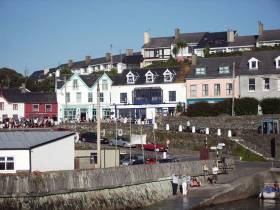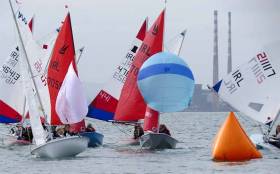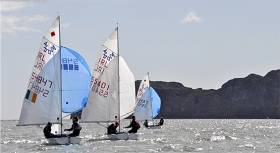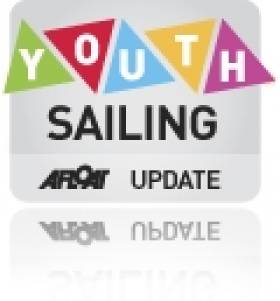Displaying items by tag: Pathway
Baltimore Sailing Club Announces High Performance Fund
Baltimore Sailing Club in West Cork is now seeking expressions of interest from suitably qualified applicants for its High Performance Fund.
Details of guidelines for the Olympic Pathway support fund and the application form can be downloaded from the Baltimore Sailing Club website HERE.
The closing date for applications is Friday 21 December.
New 'Performance Pathway Seminar' Series is Launched By ISA
In an exciting new initiative for youth sailors, the Irish Sailing Association has announced provisional details on a series of Performance Pathway Seminars.
The seminars are replacing the ISA Optimist Squads and ISA Topper Squad which have traditionally run from October to March. The change of tack does not affect summer activities which start after the ISA Pathway Nationals.
The seminars are primarily targeted at junior sailors from the Topper and Optimist classes and their coaches. There will also be sessions available to parents of sailors. Other applications may be considered.
There will be a minimum of three seminars over the winter and the topics will include but not be limited to Fitness, Psychology, Programme Design, Nutrition, Boat Transition, Olympic pathways.
The very clear switch to focussing on the education of young athletes means ISA Performance can widen the scope of how many athletes and coaches it can engage with over the course of the year. The ISA says 'the Pathway has often been criticised for not being inclusive enough so this initiative will tackle that concern head on'.
The ISA say 'Given our limited resources we feel this approach will give a better return on investment while at the same time giving the pathway much more visibility across a wider base. ISA Performance will NOT be running the ISA Optimist Squad or the ISA Topper squad this winter'.
There is additional investment going into the ISA coaching programme and it is hoped this programme will help facilitate the clubs and classes take on the role of training over the winter period.
As always the ISA Pathway Nationals will be the key event in the domestic programme. The ISA plan to invest more into the event and ISA Performance will continue to use this event to determine squads for the summer events.
Provisional Dates
OCT 29th & 30th
DEC TBC
JAN TBC
More Details and Application Process will be posted October 7th. In the meantime save the dates. It is envisaged we would have between 20 and 30 places per class association
ISA Youth Sailing Titles Decided in Howth
Howth Yacht Club hosted the ISA Youth Sailing Pathway National Championship and Optimist Trials over the four days from 31st March to 3rd April in varied conditions reports Emmet Dalton of HYC. The regatta attracted 192 entries across five classes from all corners of Ireland (plus a visitor from Italy) and produced Champions from seven clubs. Full results downloadable below.
Thursday's racing was delayed while the wind found time to behave and steady itself. The fleet wasn't too unhappy to wait in the glorious Spring sunshine before getting proceedings off. In the 420 Class, local favourites Elmes/O'Sullivan had it their own way with two bullets. The Laser Radial top spot was shared by O'Beirne (RStGYC), Durcan (RCYC) and Nicole Hemeryck (NYC). Over on the Topper course, the RStGYC was again dominating, with Jack Fahy burning up the course. Rush's Ross Morgan was definitely in a hurry on the Laser 4.7 course, leading by 6 points after Day 1. By the end of the day, the wind had picked up and a lot of tired faces reached the top of slipways, concentrating on the next race...to their dinners!
Day 2 fell victim to the element, with strong and increasing winds keeping the fleet ashore. Principal Race Officer, Derek Bothwell, was cheered by the competitors as he announced a day off. Cinemas and shopping replaced the usual windward mark targets.
With a window of opportunity in the weather, the fleets headed afloat on Saturday, hoping to catch up on the schedule with a few additional races. On the 420/Laser Radial course, four races were crammed, suiting Malahide 420 duo Gemma and Cara McDowell. The sisters closed the gap to the leaders and ended the day only a point adrift of Elmes/O'Sullivan. Radial and 4.7 gurus O'Beirne and Higgins never fell onside the top three for the day. On the Topper course, Carroll was fighting off a strong challenge from another Hemeryck, this time Ella who was only a couple of points behind. Almost a carbon copy of Day 1, Saturday saw some tired bones come ashore!
As the sailors were chasing around the race course, members and visitors did loops of the Peninsula in some spectacular cars, presented by Aston Martin and Bentley. HYC friends in Charles Hurst Motors spent a day showing off Vantages, Continentals, Rapides and, ideal for the Circuit Sailors, the new Bentley Bentayga. Rarely has the clubhouse been so full of grinning faces on a rainy day!
Going into the final day, titles could have been won or lost, testament to the incredibly close racing across a range of conditions. At the end of the day, the Champions filtered to the top and were presented with their medals by ISA President David Lovegrove and cheered by their fellow competitors.
Champions
420
Dougie Elmes / Colin O'Sullivan (Howth YC)
Girls: Champions Gemma and Cara McDowell (Malahide YC)
Laser Radial
Conor O'Beirne (Royal St. George YC)
Girls: Nicole Hemeryck (National YC)
Topper
Michael Carroll (Kinsale YC)
Girls: Ella Hemeryck (National YC)
Laser 4.7
Henry Higgins (Royal St. George YC)
Girls: Heather Spain (National YC)
Bank Holiday Youth Champs to Expect 300
May Bank Holiday weekend (29 April – 02 May) over 300 sailors will compete in Dublin Bay in seven different classes (Laser Radial, Laser 4.7, 420, Feva, Topper, SL16 and Optimist). For youth sailors, this event is the most crucial in the annual calendar as it is the decider for the top Irish sailors to compete internationally during 2011 and is the pathway for future Olympic sailors.
Not only will the ISA Mitsubishi Youth Nationals over the May weekend be an important event for youth sailors it is also a major milestone for the organisers of the ISAF Youth Worlds 2012 as it offers them the opportunity to test drive the logistics of managing such a large event incorporating three clubs, three race courses and hundreds of volunteers.
'Dun Laoghaire has a proud reputation for hosting international events such as the biennial combined clubs Dun Laoghaire Regatta and numerous world championships. However in 2011 the ISA Mitsubishi Youth Nationals is of more significance as it gives us an opportunity to test our systems in advance of the ISAF Youth Worlds 2012.' stated Event Chairman Brian Craig.
Dun Laoghaire won the bid to host the ISAF Youth Worlds 2012 from 12-21 July when, in excess of 300 sailors and windsurfing champions from over 60 nations will participate. The granting of this prestigious sailing event to Ireland is a major boost to the sport and secures Ireland's position as an ideal location for hosting world class sailing events. It also establishes Dun Laoghaire as one of the prime major racing locations in the world, capable of running multiple classes and courses to the highest international standard.
'The Youth Nationals is a significant event on the racing calendar. It involves young sailors from all of the 'Olympic Pathway' classes, some of whom are competing for places on the team that will represent Ireland in the ISAF Youth Worlds later this year. In recent years Ireland has had successes at youth level with winner of the girls Laser World Championships a top 10 at the 2010 ISAF Youth Worlds and wins at the British National Optimist Championships.
Three hundred sailors from around the country are expected to compete for national youth and junior pathway titles and the Mitsubishi coaching grant during the event.

































































